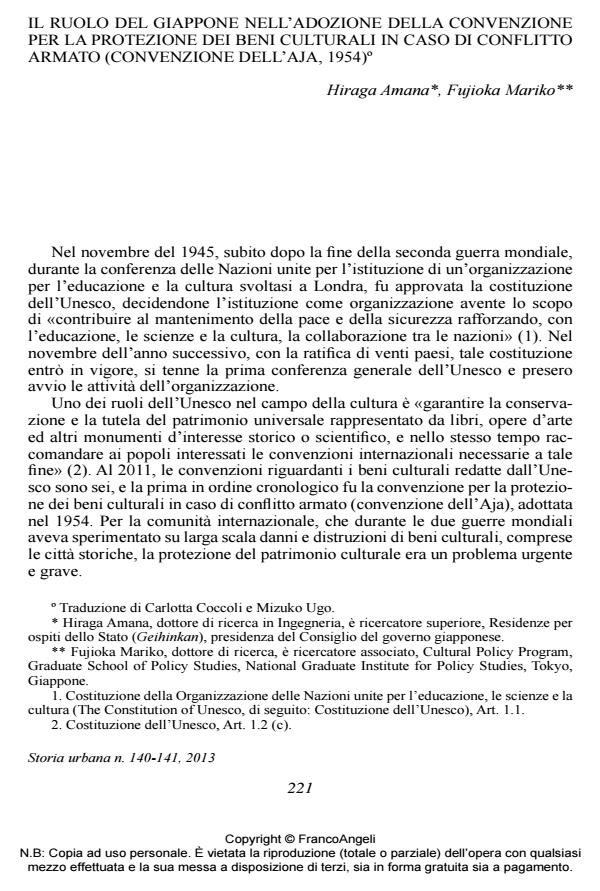Japan’s Involvement in the Adoption of the Convention for the Protection of Cultural Property in the Event of Armed Confl ict (1954 Hague Convention)
Journal title STORIA URBANA
Author/s Hiraga Amana, Fujioka Mariko
Publishing Year 2014 Issue 2013/140-141
Language Italian Pages 42 P. 221-262 File size 2831 KB
DOI 10.3280/SU2013-140008
DOI is like a bar code for intellectual property: to have more infomation
click here
Below, you can see the article first page
If you want to buy this article in PDF format, you can do it, following the instructions to buy download credits

FrancoAngeli is member of Publishers International Linking Association, Inc (PILA), a not-for-profit association which run the CrossRef service enabling links to and from online scholarly content.
In November 1945, soon after the end of World War II, the Constitution of UNESCO was adopted, and UNESCO was established. One of the UNESCO’s roles is recommending to the nations concerned the international conventions necessary for cultural property protection. As of 2011, UNESCO has six conventions concerning cultural property, the fi rst of which is the "Convention for the Protection of Cultural Property in the Event of Armed Confl ict (the Hague Convention)", adopted in 1954. For the internatio316 nal community which had experienced large-scale damage to cultural heritage during the two world wars, the protection of cultural property against the effects of armed confl ict was a pressing and serious issue at the time. Japan ratifi ed the Hague Convention in 2007, over 50 years after its adoption. However, Japan has sent experts to international conferences for the Hague Convention and has insisted on its opinions since the early 1950s during which the convention was in the process of drawing up. Following the adoption of the convention, Japan also took sincere initiatives at the domestic level with a view to ratifi cation. This paper fi rstly provides an overview of the Hague Convention and describes the background to its establishment. Secondly this paper attempts to clarify Japan’s international cooperation and contribution to the Hague Convention in its early stages when the state was reestablishing itself as a peaceful nation.
Keywords: Second World War The 1954 Hague Convention Unesco Protection of cultural properties in Japan Sekino Masaru
Hiraga Amana, Fujioka Mariko, Il ruolo del giappone nell’adozione della convenzione per la protezione dei beni culturali in caso di conflitto armato (convenzione dell’Aja, 1954) in "STORIA URBANA " 140-141/2013, pp 221-262, DOI: 10.3280/SU2013-140008